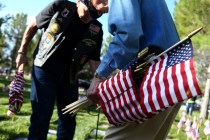Life is a Song. Sing it!
At the beginning of time, people needed one another. It was reality, not an option. From the instant we were birthed, we needed others and they needed us.
Today, the word "need" has a negative meaning and vendors do everything they can to isolate us from one another. We become "sold" on our "need" for a bigger box to live in and replace real hugs with Facebook "likes."
I truly dislike cold days, so each year I wait for spring to blossom and summer's sun to warm my bones.
Winter keeps folks inside, isolated in our respective domiciles. Spring brings flowers to plant, yards to tend, and fences over which to share the winter's happenings.
During this spring's reprieve from isolation, a neighbor (over our "fence") loaned me her favorite book. She wanted to share a piece of her enjoyment with me, so I accepted her offering.
The whimsical autobiography, "Dear Mad'm," is about an old lady who, in her late 70s, decides to leave her home near family and "stake a claim." Her new mining claim friends called her Dear Mad'm and the nicknames she gave them stuck - Dearsir and Up' n Up.
The book relates an era of her life filled with the challenges and joys of mountain life (flood, fire and friendship) and the bliss of quiet tranquility. It was a fun read, but the book was about the most important quotient of life — happiness.
It started me thinking about what defines "happy." What makes me happy, and how can I bring happiness to others?
In Dear Mad'm, her family leaves the mountain and returns back where they could watch over her in her old age. Yet all the adventures of Dear Mad'm were about learning (how a 70-plus woman survives, alone, in a remote shack on a rugged mountain), sharing calamities and milestones with others of like-mind, and discovering who she was and could still (in her old age) become — and being "depended upon."
Her city family wanted to "take care of her." Her mountain friends "depended on her" wisdom and caring. Dear Mad'm knew the difference.
One of my favorite quotes, "The grand essentials of happiness are: something to do, something to love and something to hope for," reminds me that I have always had the essentials of happiness in my life.
That knowledge kept my dad's morning phrase, "another day, another opportunity" ring through the hardships, and helped me overcome the difficulties of life.
As I watch some people rise with a frown to an early morning sunrise, or I encounter others who rush past the rare monarch feeding from a willow flower, or a driver yelling at another in front of him for doing the speed limit, I wonder what would make them happy.
What would bring a smile to their day?
There are many forms of happiness. Some true, some mock. There is the substitute of obtaining material wants, the joy of a compatible relationship, and the satisfaction of reaching a personal goal, whether physical, emotional, or spiritual.
Happiness can only come when we know who we are and acknowledge our needs. Food, water, shelter; we truly "need" them. But we also each have personal needs.
These are not so easy to list because our life experiences and learned coping skills play a part in these needs.
The bottom line is that enjoying happiness requires us (in the words of Teddy Roosevelt) to "do what you can, where you are, with what you have."
John Donne's famous "no man is an island" is true. Dear Mad'm, amidst slipping on rocky slopes, shared her biscuits and jam with her fellow miners. They helped her maintain her claim, and she fed them homemade yummies.
Even as old as she was, she found the purpose to her life - friendships; some in which she was the person needing a friend, some in which she was the friend who was needed, and often the ultimate friendship - the two-way friendship (recipient and giver).
She touched the lives of others, even (and perhaps especially) when she didn't think it mattered if she was alive or dead.
The "grand essentials to happiness" apply to each of us. What is your "something to do?" Nearly everyone can "do something."
Even if confined to bed, making a phone call to a friend can lift your spirits and theirs. What is your something to love? Many of us have family or friends who fill this need.
Many fill this void with a pet. We all need something to love who depends on us, (even if it is a pet goldfish!) And "something to hope for."
What is it that you "hope for?" (No, hoping to die so you can join your soul mate on the other side doesn't count.) Until that happens, find and spread some joy here and now!
What do you hope for today? This week?
Long-term "hopes" are good things, but also have some daily or weekly "hopes." Focus on an emotional/spiritual hope and a more tangible hope also.
We each have the need for happiness in our lives. Our needs are our personal prerequisites to happiness. Recognizing what our needs are and accepting those needs help us see how important we are.
Happiness often only requires us to look around, share with someone, or bask in the gift of the monarch sipping from the willow flower outside our window.
What is your favorite happiness quote? Live it today.
Cat Trico has been a resident of Boulder City since 2003 and is a past president of the Senior Center of Boulder City and co-founder of the Decker Lake Wetlands Preserve. As an author and editor, she contributed to "Rights, Responsibilities, and Relationships" for youth. She can be reached at cat.circa1623@gmail.com.



